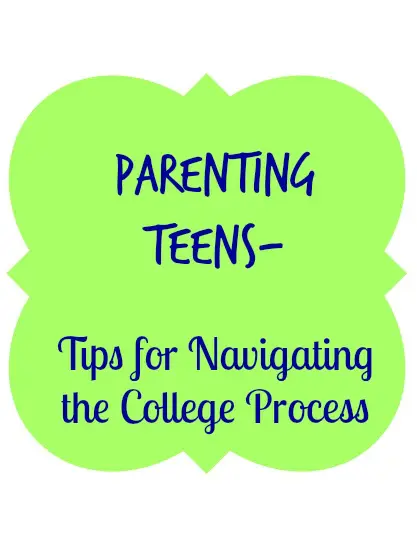The admissions process for college can be a daunting task for seniors and their parents. I am so honored to have the parenting expert and author of the recently released, A Survival Guide to Parenting Teens: Talking to Your Kids About Sexting, Drinking, Drugs, and Other Things That Freak You Out, Joani Geltman, MSW, agree to share a section of her new book with us. Here is my Amazon affiliate link for the book. She is all about helping 21st century parents survive the teenage years with sage advice for parenting teens from saving for college to preparing your teen for the college application process. From researching schools to gathering application materials, there is a lot to do! Here is how to get your teen on board with the college application timeline.
In addition to her experience as a psychology professor, school counselor and parenting coach, Joani Geltman has had the experience of raising her own famous teen – Ari Graynor, who has starred in the CBS Television Series, Bad Teacher. Armed with advice for tackling everything from the Smartphone Addict, enforcing the dreaded task of summer reading, to dealing with the homework avoider and the procrastinator, Joani addresses over 80 parenting teens topics that confront today’s parents.
My daughter just graduated from high school recently and is starting her first year at one of the top engineering schools on the East coast. Therefore, I have updated this post to include a rough college application process timeline and republished it here for my newer readers to enjoy.
Tips For Navigating the College Admissions Process
What should seniors be doing to prepare for college? As parents we like to make sure we have all the answers but when it comes to creating an admission plan for college, we can find ourselves a little rusty. There is so much consider from test scores, to the common application, to letters of recommendation. College counsellors can be a great help but some schools have very limited access.
As a parent, nothing could be more welcome than some help navigating the college admissions process. There is so much to know and keep track of from extracurricular activities to application fees. I know my own parents had trouble with this as it changes so much so quickly. It is often an area in which both parents and teens can feel confused and overwhelmed. That is why I jumped on the chance to have an expert share tips to help teens and parents prepare for the college application process.
I was given permission to reprint Chapter 24 from Joani Geltman’s new book. This section is reprinted with exclusive permission from-
A Survival Guide to Parenting Teens: Talking to Your Kids About Sexting, Drinking, Drugs, and Other Things That Freak You Out
by Joani Geltman, MSW
© 2014 Joani Geltman
All rights reserved.
Published by AMACOM Books
www.amacombooks.org
Division of American Management Association
1601 Broadway, New York, NY 10019
Senioritis-parentitis: Surviving the college application process and tips for successful college visits.
If you have a senior in high school, I’m sure your teen is suffering from a condition that is commonly known as Senioritis. As a parent, you’re suffering from a corresponding and complementary affliction, Parentitis.
Symptoms of Senioritis include intense procrastination, increased surli- ness (if that’s possible), increased avoidance of parents and home, and rejec- tion of all suggestions on how to complete college applications.
Symptoms of Parentitis include high anxiety and sleepless nights, weakened eyesight from too many hours looking at college websites on the computer, and fatigued fingers from keeping up with college application submission deadlines on the family calendar.
Here’s the Problem
For parents, the anticipation of their child all grown up and ready to go off to college is both exciting and terrifying. Remembering their own college years, they can’t wait for their kids to experience all the wonderful things they did, which may have included finding and marrying the love of their life, making lifelong friends, finding a passion and/or career, and making memories that last a lifetime.
But there is trepidation as well. What if my teen doesn’t get the grades and SATs that will get her into the college I want, I mean she wants, to go to? What if he doesn’t write his essays on time, or worse, what if they’re bad? Furthermore, what if she doesn’t get her applications in early or at least on time? What if we don’t have enough money to send them to the school of our, I mean his, dreams? What if my best friend’s kid has better grades and better SATs and gets his essays and applications in before mine, and he gets into the school I want my daughter to get in? And what if ______?
This is the stuff ulcers are made of.
So you become the college Nazis. “You will get your essays done this weekend, or you won’t go out!!!! Visit colleges on the weekends we want to go! You will go to SAT tutoring or you will be grounded!” And for all this commitment and time and money you give to your teen in support of this college journey, what do you get in return? “Leave me alone. I’ll do it!”
Why It’s a Problem
The whole college admission process is a lesson in letting go. You can nag, you can hound, but the bottom line is you can’t “make” your teen get this work done. To combat Senioritis, parents must pay less attention to the symptoms and more attention to the underlying issues. If you label the procrastination as laziness and avoidance, your teen gets defensive and angry, feels criticized, and ends up procrastinating even more. Not exactly the out- come you were hoping for.
Here are some of those underlying issues:
1. Overwhelm
Your teen feels completely overwhelmed by the additional responsibilities of the college process, over and above the normal load of school, activities, and friends. Choosing which schools to apply to, completing the applications and essays, and finding teachers who know and like them enough to give them recommendations gets added to the “to do” list. This is in addition to improving or maintaining good grades (because God knows everyone keeps telling teens how important those first-semester senior grades are). And by the way, could you get the lead in the school play? Score a few touchdowns? Do a great community service project? And—only if you have time—would you mind curing cancer? It will look great on your college application.
Not only are they feeling their own sense of impending doom about where they will end up, but they also feel your expectations, their school’s expectations, their friends’ expectations, not to mention their grandparents, aunts, uncles, neighbors, and friends of their parents asking every time they see them, “So how’s your college application thing going?” Imagine what it feels like to have everyone who has ever known you be so interested in the rest of your life. This is expressed through anger and avoidance.
2. Worry About Rejection
Because your senior is acutely aware of all that you want for her, and she obviously has her own fantasies and expectations, she’s full of anxiety and dread for that day when the acceptances or rejections show up online or in the mail. What if I don’t get in anywhere, or I don’t get in where I want to go or where my parents want me to go? Ultimately this whole college process feels like the biggest report card of her life, like an evaluation of who she is as a person. You get an A when you get in where you want to go, and a big, fat F when you get rejected. The worry teens feel about disappointing their parents and disappointing themselves is palpable. Often it comes across as anger and avoidance.
3. Fear Of Independence
Though your senior is excited for this next step, change is not easy. Leaving you guys is terrifying, even if they’re not showing it. But believe me, the more angry they act toward you, the more scared they are feeling inside. This is a useful defense mechanism. They’re also terrified of leaving their friends, their lifeblood, their support, and their source of acceptance. This fear, too, comes across as anger and avoidance.
You get the picture. The anger, the procrastination, and the avoidance are all expressions of feeling overwhelmed and anxious. Your teen is engaging in magical thinking. “If I put this off long enough, I don’t have to deal with the consequences.” This is all completely normal. This is the first and single most important decision they’ve had to make in their lives. They have no previous experience on which to draw that tells them that it will all turn out OK. As parents, you know it will. But they really aren’t willing to take your word on that.

Here’s the Solution
Avoid starting every conversation with: “Did you start your essay? Did you do your common app? Did you talk to your teachers about a recommendation? You know you’re running out of time!”
Try this instead: “I get how overwhelming this all feels. You have a lot on your plate with school, and sports and college stuff; I know I would just want to get in bed and cover my head for the next six months. How can I help? I’m happy to do whatever you need. Think of me as your administrative assistant, not your boss. I don’t want to have to harp on you all the time. I know how annoying that is. Can we come up with a plan together? Maybe the plan includes me bugging you. Let’s break this up into smaller projects, so it won’t feel so overwhelming. If I do start to annoy you, let me know and I’ll back off.
I love you, and I want you to have the kinds of choices you deserve. We don’t want to spend this year arguing with you constantly; we want you to take ownership. This will be a sign to us that you’re ready for college. If you choose not to participate in this process, then that will be a sign to us that you might not want or aren’t ready for the independence of college. What do you think? Are you up for this? Or are you feeling you might want to take a year off after high school to get yourself ready? Whatever you choose is fine with us, but commit to one or the other.”
Create An Admission Plan For College
Now develop an action plan. Sit at the computer together with your teen doing the typing. Print out the plan, including dates he hopes to have things completed by. Put it up in his room, on the refrigerator, and in the bathroom if you need to. Put those iPhones, iTouches, and iPads to good use with elec- tronic reminders for the weekly goals he’s made for himself. Be creative. Just saying, “Get it done!” is not helpful. Working with your teen to come up with a plan is.
But please, and I’m begging you here, do not do it for them. Do not come up with your schedule or your way of doing things. This is a setup for disaster, because they will not take ownership of your plan. When you see them screwing up “your plan” the arguing commences. And, by the way, it is no problem if you want to use some incentives like money, upgraded phones, clothes, trips to the Caribbean (only kidding on that one). But seriously, whatever works. Businesses thrive on using incentives. If it’s OK in your job, why not in theirs?

College Visit Tips
Now, a few college visit tips. Remember this is your teen’s opportunity to just soak in the atmosphere. This is not the visit where she’s worried about what the biology labs look like, or course selection. I know that’s what you’re interested in. But for these first visits, you really need to zip it up and let it be about your kid.
She’s looking at the students and wondering, Are there kids here I could imagine being my friends? Does the campus feel like a place I feel comfortable and safe in? Could I sleep in this dorm and imagine myself feeling at home? This is what interests your teen.
So walk along beside her, keep a low profile, and if you have questions ask them another time. There will always be the second visit if they like the school and, most important, if they get in! Many kids avoid college visits prior to acceptance because they worry that if they “fall in love” with a school and don’t get in, it would feel devastating. So keep that in mind.
On the drive home from a college visit, try to refrain from sharing your impressions the second you get in the car. Often parents are much more enthusiastic about a school than their teen is, and that shuts him down from talking to you. Give him time to digest the visit. Some teens will start talking right away; others need time to process. Remember that visiting colleges makes everything about the college process real and scary. They may need some time just to sit with it all. So if they immediately put their earbuds in, just let them be. On your way home, stop for a bite to eat, some ice cream, or coffee, and maybe ask, “So what did you think?” in a calm, neutral voice, and see where it goes.
Thanks again to Joani Geltman, MSW for sharing her tips for parents helping their kids get into colleges.

College Application Timeline
Here’s a general timeline for the college application process, spanning from junior year of high school through the summer before freshman year of college:
Rising Junior Year Summer Before 12th Grade
- Standardized Tests: Register, prepare, and take the SAT and/or ACT. Don’t wait till last minute to register, they fill up quickly!
- College Visits: Continue visiting colleges.
- Research Colleges: Finish researching colleges and make a list of under 10 potential schools.
- Research Financial Aid: Start learning about financial aid, scholarships, and the FAFSA process.
- Request Recommendation Letters: Ask teachers for letters of recommendation, if you didn’t already.
- Internships/Jobs: Gain experience through internships, jobs, or volunteer work.
- Essay Drafts: Start drafting your college essays and personal statement.
Senior Year (12th Grade)
Fall (September – November)
- Finalize Applications: Complete application forms, finalize essays, and gather all necessary materials.
- Early Decision/Early Action: Submit applications for Early Decision/Early Action (usually due in November).
- Standardized Tests: Take or retake the SAT/ACT if needed.
- FAFSA: Complete and submit the FAFSA as soon as possible after October 1.
Winter (December – February)
- Regular Decision: Submit Regular Decision applications (deadlines typically in January).
- Scholarships: Apply for scholarships.
- Follow-Up: Ensure all parts of your applications are received by colleges, including test scores and transcripts.
Spring (March – May)
- Admissions Decisions: Receive and review acceptance letters and financial aid offers.
- College Visits: Attend admitted student events or revisit campuses if needed.
- Decision: Make your final decision and notify the chosen college by May 1.
- Waitlists: If waitlisted, decide whether to remain on the list and follow any necessary steps.
Summer (June – August)
- Finalize Enrollment: Complete any final enrollment paperwork and submit required deposits.
- Prepare for College: Attend orientation sessions, register for classes, and make housing arrangements.
- Health and Insurance: Ensure you meet health and insurance requirements for college.
- Packing and Moving: Begin packing and preparing for the move to college.
This timeline is a general guide and may vary depending on individual circumstances and specific college requirements. Be sure to check the exact deadlines and requirements for each college you are applying to.
Conclusion
This will be a challenging year, but a year full of growth for all of you. Be patient with the process, continue to “get” their struggle, and provide support and understanding. This too shall pass, and soon enough you’ll have the car packed and ready for this next step, the arguments about applications and recommendations already forgotten. The bottom line is it will all get done, one way or another, and if it doesn’t, take that as a sign that your senior is telling you that this might not be the year for college. Senior year is a rite of passage for everyone. Just hold on tight and enjoy the ride.
I hope you found these tips helpful for navigating the college admissions process. Did any part of it hit home in particular? Any extra tips you want to share in preparing for the college application process?
Related Posts:
5 Benefits Of Volunteering And Family Volunteer Opportunities
Survival Guide To Parenting Teens Over The Summer
Useful Tips for College Students- Advice For University Life


diane says
I have a teen and a tween and parenting them is SO different than any other phase of their development! I am already stressing out about the college process! Great information..thanks for sharing!